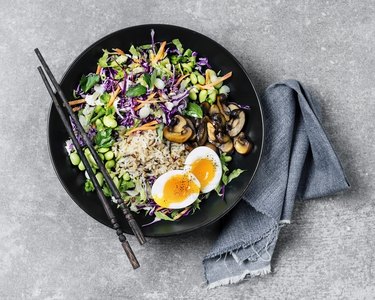
If you've decided to cut sugars out of your diet, you're on the fast track to better health. Added sugars are blamed, in part, for the obesity epidemic, and they could increase your risk of death from cardiovascular disease.
But going sugar-free is tricky; foods you wouldn't think would contain sugar do, and some healthy foods such as fruit contain natural sugars. Learning which foods you can and can't have on your sugar-free diet is half the battle—then you have to actually stick to it.
Video of the Day
Video of the Day
Cut These Obvious Culprits
Candy, cake, cookies, brownies, ice cream and sweetened beverages such as soda and sweet tea are obvious no-nos on a sugar-free diet. You'll also need to abstain from cane sugar, high-fructose corn syrup, molasses, maple syrup, honey, agave and anything made with those sweeteners. Avoid products containing corn sweetener, demerara and evaporated cane juice.
Beware of Hidden Sugar Sources
Become a savvy shopper on your no-sugar diet. Many processed foods you wouldn't think contain added sugar actually contain a lot of it. Salad dressing, pasta sauce, sauces and marinades, condiments like ketchup and canned beans often contain sugar.
Also watch out for cereals, flavored yogurt and milk, granola bars, and energy bars. "Fruit juice concentrate" may sound healthier than sugar, but it's still sugar. When reading labels, note that anything ending in -ose is a form of sugar.
Skip Foods With White Flour
Some no-sugar diets suggest you cut out foods with white flour. These foods are typically digested very quickly, and the starch is absorbed into your bloodstream in much the same way pure sugar is. This can lead to blood sugar spikes and fluctuations in energy.
Cut out baked goods made with refined flour, white pasta and white bread. Eschew crackers and any other breads not made with 100 percent whole grain. You may also want to cut out white rice, which is highly refined and quickly digested.
Consider Fruit and Milk
Certain sugars occur naturally in foods, such as milk (lactose) and fruit (fructose). Some people may cut these foods out of their diets, but you don't have to. Both milk and fruit offer a multitude of beneficial nutrients, along with the sugar, which makes them healthy foods.
However, watch out for flavored dairy products that contain sugar, canned fruit with sugar and processed fruit snacks. Eat dried fruit with no added sugar in moderation, as it is a concentrated source of sugar. Look for 100 percent fruit juice, or just eat the whole fruit—it's a better source of fiber and other nutrients.
Focus on These Foods
No-sugar diets can be quite simple if you stick to eating whole foods such as fruit, vegetables, lean meats, fish, whole grains, and nuts and seeds with a little bit of plain dairy.
At each meal, fill half your plate with fresh fruits and veggies, a quarter of your plate with lean protein and a quarter of your plate with a serving of whole grains. Have a serving of dairy on the side. Snack on fresh fruit, cut-up veggies with hummus and nuts. For dessert, choose fresh berries with plain Greek yogurt for a little bit of sweetness and creaminess.
READ MORE:
- NHS Choices: Is Sugar Causing the Obesity 'Epidemic'?
- American Heart Association: Added Sugars Add to Your Risk of Dying From Heart Disease
- HuffPost Healthy Living: 5 Hidden Sources of Sugar in 'Healthy' Foods
- Dr. Stephen Sinatra's Heart MD Institute: Hidden Sources of Sugar
- Today Health: Trying a No-Added-Sugar Diet? Avoid These 5 Biggest Mistakes
- New Health Guide: No Sugar Diet
- Joy Bauer: Refined Grains: How Food Affects Health
- TeensHealth: MyPlate Food Guide